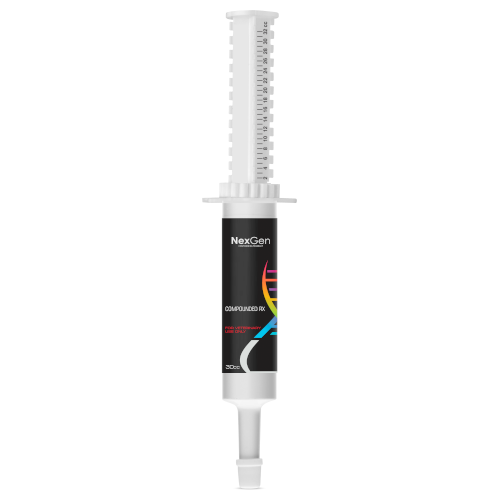
Fluconazole 10 gm/30mL, Oral Paste, 30mL Syringe
Login for pricing
- Brand
- Mixlab
- SKU:
- NC-0232
- Product Type:
- Paste
- Size:
- 30ml
- Administration:
- Oral
There are over 70,000 species of fungi, and approximately 50 that can cause disease in animals and humans.1 Among the latter, there are four classes:
-
Superficial— Affecting the skin
-
Cutaneous— Affecting the skin and/or hair
-
Subcutaneous— Can spread from the surface of the skin to deep tissue
-
Deep mycosis—Affecting the upper and lower respiratory systems
Additionally, there are two kinds of fungi:
-
Primary fungi— Can affect any horse, healthy or sick
-
Opportunistic fungi—Affect horses that are immunocompromised by another illness
Fungi are parasitic, spore-producing organisms that obtain sustenance by absorbing nutrients from the hosts (in this case, horses) on which they grow.2 Many species of fungus exist in the environment; as indicated above, only some cause infections. The primary source of most fungal infections is soil. These can be acquired by horses via inhalation, ingestion, or through the skin (usually when a cut or wound is present).
Symptoms and Diagnosis
The symptoms of fungal infections in the horse are varied depending on the type of fungi and the infection site. The most common symptoms include:
-
Cough
-
Rapid breathing
-
Nasal discharge
-
Lack of appetite
-
Respiratory distress
-
Hemoptysis
-
Weight loss
-
Lesions
-
Skin ulcerations
-
Facial discomfort (usually with nasal involvement)2
Diagnosis of fungal infection will includes the horse’s medical history, a physical examination, imaging, and diagnostic tests.1 Depending upon the presentation, the veterinarian may look for abnormalities like rashes or lesions, or may check the horse’s lung sounds with a stethoscope. An endoscopy may be done in cases of suspected lung involvement (e.g., oropharyngeal candidiasis, a commonly-occurring fungal infection in horses).
To rule out other conditions, blood tests may be needed, such as fungal and bacterial cultures, complete blood count (CBC), blood chemistry panel, blood urea nitrogen (BUN), glucose level, and packed cell volume (PCV). Radiographs (x-rays) may be ordered, or an ultrasound and cross-sectional CT scan may be ordered for more detailed insights.
Where to buy Fluconazole
Fluconazole is available in the U.S. through several pharmaceutical manufacturers and through veterinary custom compounding companies.
Fluconazole carries numerous potential drug interactions. Please consult your veterinarian prior to beginning any treatment regimen.
FOR RX ONLY: A valid prescription from a licensed veterinarian is required for dispensing this medication.
2Merck Veterinary Manual.









